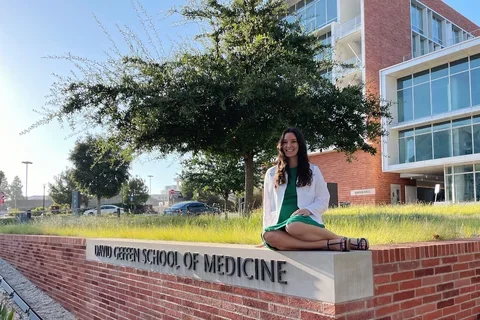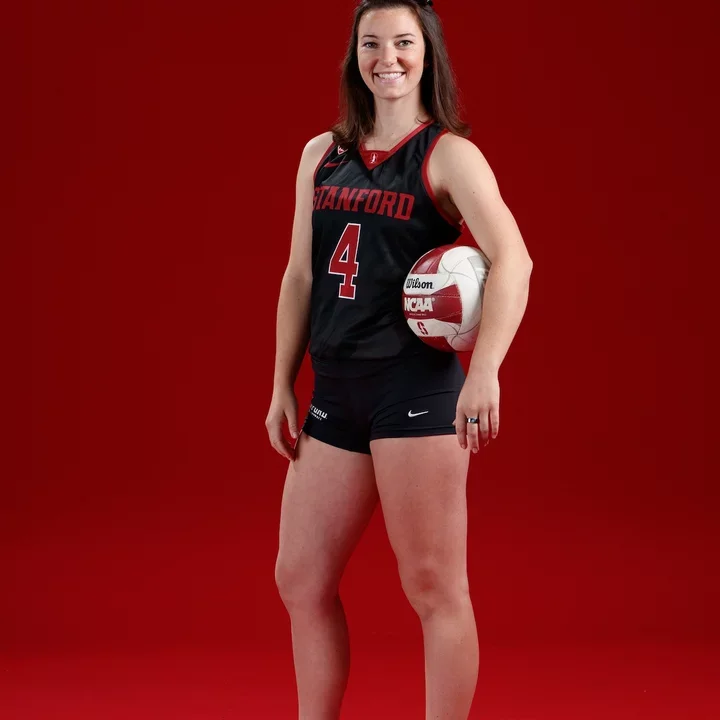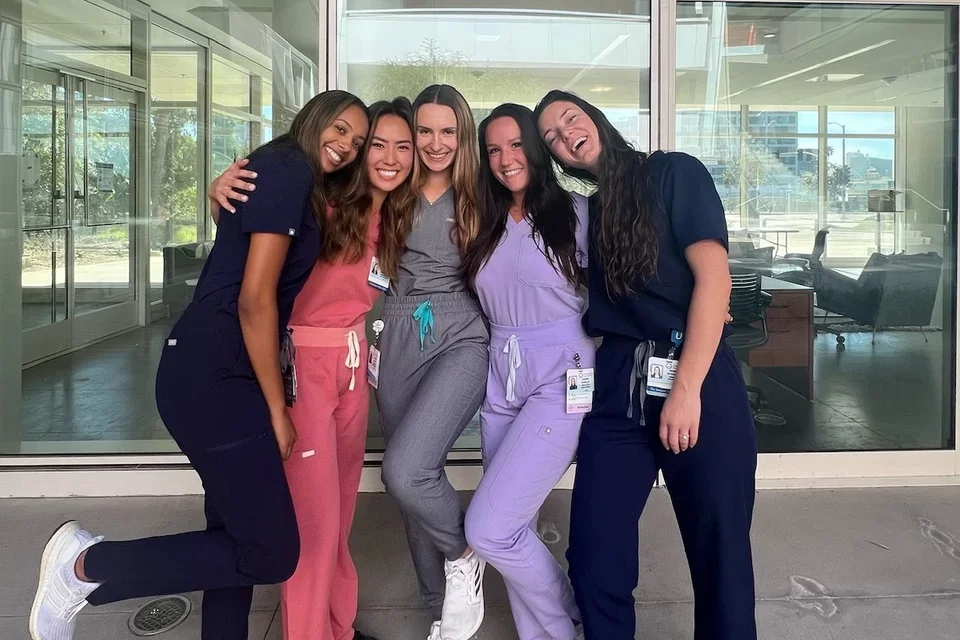From Aspiring Olympian to Future Urological Surgeon-Scientist
Student Spotlight

Meet Shannon Richardson
When medical student Shannon Richardson reflects on her childhood in Morgan Hill, California, she remembers looking up to her father—an engineer and Olympic bobsledder.
His brain worked around the clock.
“If we were at a restaurant, he’d be doodling on a napkin,” Shannon explains. “When we went to Disneyland, he spent his evenings tirelessly workshopping his next idea while we were asleep.”
Seeing the passion, love, creativity, and energy her father put into his work inspired Shannon to do the same with her athletic and scientific pursuits. She aspired to be an Olympian, like her father, although competing in a much different sport: beach volleyball.
Her father happily added “coach” to the list of hats he wore.
“He taught me to close my eyes and visualize myself hitting the ball as I fell asleep each night before matches,” Shannon recalls.
Mental modeling strategies aside, determination may be the most powerful lesson Shannon took away from her years of training under the guidance of her dad.
“My dad grew up in California’s Bay Area, just wanting to go to the Olympics to bobsled,” she says. “But there wasn’t any snow around, so everyone would laugh and say, ‘Really? You want to go bobsled? You've never even gotten in a sled.’”
Determination shielded him from the naysayers’ doubts.
“He just went to the Olympic Training Center, committed to his plan, and trained really hard,” Shannon says. “He made the team and went to the Olympics.”
Shannon’s father instilled in her the idea that anything’s possible if you put your mind to it.
Fun Fact: Shannon has a dog named Luna who will be the ring bearer at her wedding. Shannon, her fiancée, and Luna love spending weekends at a local park or at the beach.

Getting into Med School
Before graduating high school, Shannon turned her determination toward a future in medicine. An international public health nonprofit called Partners in Health (PIH) illuminated her path forward.
“Learning about PIH’s work showed me how many people around the world don't have access to medical services,” Shannon recalls. “I knew then I wanted to commit my life to pursuing medicine and helping people gain access to the care they deserve.”

Athletics led Shannon to undergrad at Stanford, where she played for their National Collegiate Athletic Association (NCAA) Division I beach volleyball team and was elected Phi Beta Kappa. During her years at Stanford, she volunteered for a local emergency room. She became fascinated with pain management, enough to make that topic the focus of her honors thesis in Human Biology.
Working on that thesis—looking for ways to advocate for patients through research—inspired Shannon to pursue her masters in Epidemiology and Clinical Research. Her work through both her honors and master’s theses bolstered her determination to go to medical school.
Committed to finding a medical school with a strong Global Health Program, Shannon found her way to the David Geffen School of Medicine at UCLA (DGSOM).
Life as a Med Student
Looking back on her medical school experience, Shannon sees how her athletic training informed her approach to clinical training. For one, she started at DGSOM knowing how to work as an adaptable and effective member of a team.
“Particularly with beach volleyball, when you're working really closely with one other teammate, you learn how to build trust with that partner,” Shannon says. “Having that experience helped me find ways to build connections with the people I'm working with.”
Shannon’s experience with athletics also reinforced her study habits. Handling the compounding demands of academics and sports in undergrad drove her to find ways to get the most out of every moment of the day. By the time she got to medical school, she’d mastered the art of creating and abiding by a schedule.

For Shannon, one of the most challenging parts of honoring her med-student schedule is spending less time playing volleyball. She plays with a club league at UCLA and makes as much time for physical activity in her busy schedule as possible.
The fulfillment she feels when considering her future in medicine makes shifting priorities worth it. Thinking about her long-term goals helps her find peace when she’s missing her sport.
“I decided to prioritize medicine, because I just realized that, for me, medicine was going to bring the most fulfillment and meaning to my life.”
A Future in Urology Takes Shape
Like many medical students, Shannon realized what specialty she wanted to practice during clinical rotations. Urology captured her interest for many reasons, primarily because it would provide opportunities to build close relationships with patients.
“It's definitely a field where patients often have sensitive complaints,” Shannon explains. “You have to very quickly build trust with the patient, so you can truly help them with whatever challenge they’re facing.”
Urology is a surgical specialty—very technical. The prospect of continually improving technical skills as a urologist appealed to Shannon’s strong athletic sensibilities.
“Having strong patient relationships while also honing technical skills were the two biggest factors that pulled me toward urology.”
Urology’s research prospects interest Shannon as much as its clinical aspects. Throughout medical school, she’s been investigating how focal therapy can impact surgical or radiation treatment timelines in prostate cancer cases under the guidance of Professor and DeKernion Endowed Chair in Urology at UCLA, Dr. Leonard S. Marks.
“Using technologies like targeted MRI-guided biopsies for prostate cancer active surveillance has given me a rich sense of how urology lies at the intersection of clinical practice and research, each inspiring the other.”
Shannon presented her research as a podium presentation at the 2024 Annual Urological Association Annual Meeting in San Antonio, Texas.

Shannon’s Future as a Urological Surgeon-Scientist
While identifying a medical specialty marks a huge step in a med-student’s career, Shannon has always been equally attentive about where she wants to practice as she has about what she wants to practice.
Applying her medical knowledge globally—in the places most in need of it—has always her driving overarching goal.
Early in med school, she joined a global surgery research group, the Program for the Advancement of Surgical Equity (PASE).
“I was fortunate to be offered the opportunity to lead a study assessing the feasibility and accessibility of a mobile phone-based triage tool to improve timely follow-up trauma care in Cameroon.”
The phone-based tool proved reasonably accessible for most patients. Unfortunately, it remained out of reach for low-income patients living in rural areas. e
“Although I knew that not all new technologies would benefit the most vulnerable patients, seeing these phenomena unfold firsthand through my own data further fueled me to ensure equitable access to innovative medical practices.”
Most recently, Shannon spent several months in Maputo, Mozambique working on longitudinal research on prostate cancer prevalence and outcomes she’s conducting as a member of DGSOM’s Global Health Equity Pathway.
Every day Shannon gets closer to graduating also sharpens her vision for the future.
“I can’t imagine being anywhere else for medical school,” she says. “UCLA has truly fostered my love for clinical research, and I now aspire to maintain an academic emphasis throughout my training with a goal of one day becoming a urological surgeon-scientist.”
Picturing herself advocating for patients, pursuing research to answer difficult questions, and improving health equity across the international community, Shannon looks forward to the future with optimism, and of course, the characteristic determination she learned from her father.



